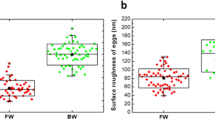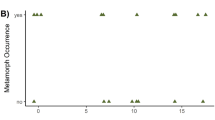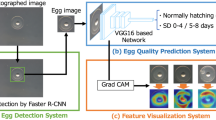Abstract
A NUMBER of experiments were performed on the eggs of Cyathostoma lari in an attempt to identify the stimuli that cause the eggs to hatch, both inside and outside the host1,2. This could indicate the regions where the larvae hatch from the eggs and penetrate the gut mucosa.
This is a preview of subscription content, access via your institution
Access options
Subscribe to this journal
Receive 51 print issues and online access
$199.00 per year
only $3.90 per issue
Buy this article
- Purchase on SpringerLink
- Instant access to full article PDF
Prices may be subject to local taxes which are calculated during checkout
Similar content being viewed by others
References
Threlfall, W., thesis, Univ. Wales (1965).
Threlfall, W., Nature, 206, 1167 (1965).
Rogers, W. P., Nature, 181, 1410 (1958).
Rogers, W. P., Proc. Roy. Soc., B, 152, 367 (1960).
Dougherty, E. C., Ann. N.Y. Acad. Sci., 77, 27 (1959).
Author information
Authors and Affiliations
Rights and permissions
About this article
Cite this article
THRELFALL, W. Experiments on Eggs and Adult Specimens of Cyathostoma lari E. Blanchard, 1849. Nature 212, 1063–1064 (1966). https://doi.org/10.1038/2121063a0
Issue date:
DOI: https://doi.org/10.1038/2121063a0
This article is cited by
-
Beitrag zur Morphologie der Larven der Nematodenart Cyathostoma lari Blanchard, 1849, während der exogenen Entwicklungsphase
Zeitschrift für Parasitenkunde (1970)



